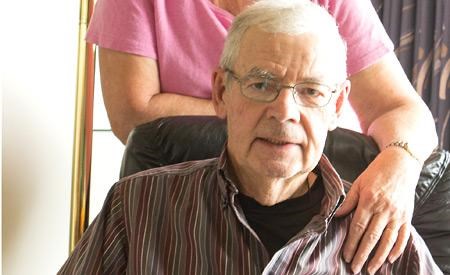A documentary about living with Parkinson’s disease features a Powell River resident who has coped with the illness for eight years.
Hank Cummings, who is approaching his 80th birthday, was diagnosed with the disease when he was 72 years old.
The 60-minute documentary features six people including Hank, who share their stories of what it is like to live with the disease. Funded by Parkinson Society British Columbia, the film, called Undefeated. An Intimate Portrait of Parkinson’s, aims to raise awareness.
It is estimated that 11,000 British Columbians and more than 100,000 Canadians live with the disease. It causes tremors, rigidity, postural instability, difficulty talking, walking and swallowing, reduced facial expression and, in some cases, depression and dementia. There is currently no known cure.
The film crew was in Powell River for two days. They set up their equipment at the Cummings’ home, asked questions and started filming. “They asked about your everyday life, how you were diagnosed and what do you do now,” Hank said.
The crew also interviewed Mary, Hank’s wife of 53 years, and their son, Paul. On the second visit they asked Hank to perform simple tasks, like brushing his teeth and tying his shoelaces.
One of the questions the crew asked him was what did he think when he was diagnosed? “For some reason, I wasn’t too upset,” said Hank, who was a sheet metal mechanic at Powell River paper mill before he retired at 58 years old. “I wasn’t freaking out or anything like that...I’m not happy that I got it, but I accepted it. You’ve got it and you have to live with it. It’s as simple as that.”
His neurologist told him he would “probably be pretty good for a decade. My first seven years were pretty good,” Hank said. “My Parkinson’s was progressing slowly, but the last year, year and a half, it’s picked up speed.”
Hank said he is very weak now, tired and he’s lost some of his appetite. “Lots of time I forget,” he said, but Mary pointed out that perhaps he can’t blame Parkinson’s for that. “So do I,” she said.
Hank was unofficially diagnosed when he and Mary were on holiday and on their way back from Alberta. They stayed at a bed and breakfast and another couple was there at the same time. “The chap turned out to be a retired neurosurgeon,” said Hank. “We were having breakfast with them and he asked me several questions. He saw I was struggling with my right hand and he had watched me walk the night before. I guess I was kind of dragging my leg and I didn’t know it.”
The doctor told Hank that he thought he had Parkinson’s and advised him to see his family doctor when he returned home. Hank did and was sent to a neurologist in Vancouver who specialized in Parkinson’s. “He diagnosed me with muscular rigidity,” said Hank. “It affects one side of the body or the other or both. I was fortunate it was my right side, because I’m left-handed.”
Hank started taking medication right away but exercise is just as important as medication, Hank said.
Mary, a registered nurse who worked for the last 17 years of her career at Olive Devaud Residence, added that when people exercise, their brain produces dopamine, which is what people who have Parkinson’s lack. “It just gives you an extra little boost, I think,” she said.
Hank works out at a local fitness centre three days a week. Four days a week, he walks the Timberlane athletic track using urban walking poles.
The disease has slowed him down, Hank said. What used to take him 15 minutes to do now takes two to three times as long. As well, his voice is becoming softer as time passes and swallowing food is starting to become a bit of a problem.
Mary pointed out that every person who has Parkinson’s has a whole different set of symptoms. Some people get them all, she added.
There are about half a dozen categories of Parkinson’s, Hank said, and beyond that are individualities. He thinks the documentary will illustrate the range of symptoms people cope with as well as raise awareness of the disease.
Hank and Mary are attending the premiere of the documentary tonight, Wednesday, September 18, at the Scotiabank Theatre in Vancouver. They will meet the other people in the film in addition to the producers, writer and director.
Hank says he gets great support from Mary, who he describes as his spouse and caregiver.
While it is important for spouses to support their partners, they also have to let them do what they can do, Mary said. “You have to realize that what they can do today, they can’t necessarily do tomorrow. Every day is different.”
Hank said it is important for spouses to be patient, because it takes people with Parkinson’s so long to accomplish a task.
Both Hank and Mary regularly attend a support group together. Mary said it is good to go to the meetings, because they learn little tricks from other participants. The group, which includes spouses or caregivers as well as people with Parkinson’s, gets together once a month.
Hank and Mary also have a lot of support from their three children, Gail, Paul and Brent. Paul and Brent are in the process of putting on Oktoberfest, a Parkinson’s fundraiser. The tickets were all sold out five weeks ago, before the event was even publicized. “In a matter of four days, we went from 10 tables left to none,” said Mary. “I think it’s going to be fun.”
The film will be aired at 8 pm on Global News BC1 on Wednesday, September 25. It will also be aired through Shaw Cable’s Video On Demand service from September 26 to October 31.
To find out more about Parkinson’s or the society, interested readers can visit the society online.



